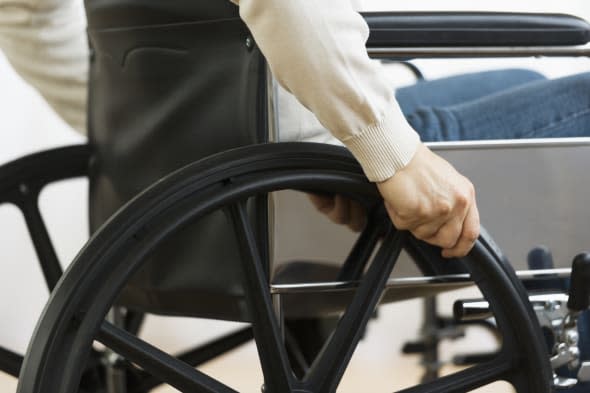Disability equipment and how to get it

If you have a disability that means you're struggling at home or out and about, you may be eligible for help with equipment or adaptations at your property. Here's what you need to know about choosing the right equipment, and where to start if you require assistance.
Related Searches
What is available
No matter what particular daily tasks you struggle with, technology can almost certainly make life easier.
As well as wheelchairs and mobility scooters for getting around, there are products to assist with bathing or using the toilet, such as sit-in baths and showers, raised toilet seats or grab rails. Kitchen adaptations like floor-level units with lower work surfaces, and special taps and utensils are also available to help, and there are many rise-and-recline chairs and beds that can make getting up and down easier, not to mention stair and wheelchair lifts.
Hearing and visual aids are widely available, and when it comes to safety and security, there are a number of gadgets to help, from personal alarms linked to a 24-hour service in the case of an emergency, to detectors in case you fall, monitor vital signs, or environmental control systems that allow you to operate everyday equipment such as the phone, TV or lighting via a central control unit.
Choosing equipment
Where possible, it is wise to seek professional, independent advice when choosing equipment, especially if you require an expensive item. Either the social services department of your local authority, or an occupational therapist or physiotherapist at a hospital should be able to help you to decide what is suitable, and advise on what is available.
But whatever your needs, always make sure the item is comfortable. If possible, try it out or ask for a trial period in the home so that you can properly test its suitability. You should also check whether the item needs to be serviced, what after-sales service is provided by the supplier, and whether repairs and maintenance can easily be taken care of. Good quality products should have been tested by the British Standards Institute, so look for the BSI Kitemark before buying.
Lastly, you may want to consider insuring your equipment, particularly expensive items, in the case of accidents or breakdown.
Where to buy
There are many private companies that sell disability equipment, many of which can be accessed online or via mail order catalogue, so if you plan to buy your equipment new, the local Yellow Pages or an online search will point you in the right direction.
However, disability equipment can be expensive, so you may want to consider buying second-hand. Both the charity Scope and the Disability Equipment Register produce publications that list second-hand equipment for sale, so these are a good place to start.
Remember that if you're buying equipment intended for use by disabled people and relating to your own disability, you will not have to pay VAT, either when you buy or if you need to service the equipment. And if you are over 60 you can get mobility aids for your home at a reduced rate of 5 per cent VAT.
Help with finance
If you are struggling to meet the costs of buying disability equipment or home adaptations, try your local authority first. Legislation dictates that social services departments have a duty to provide services to support disabled people, but they will need to carry out their own assessment of your needs in order for you to qualify for free equipment or a funding grant. Minor adaptations (costing less than £1,000) are often provided free, while for more extensive changes, you may qualify for a means-tested Disabled Facilities Grant. Again, contact your local authority to find out more.
%VIRTUAL-AFCSponserAds%
Items such as wheelchairs, visual or hearing aids may be provided by the NHS following an assessment, and the case of the former, should you wish to buy a more expensive wheelchair than the NHS can provide, you may be eligible for the voucher scheme to help you meet the cost. It is also possible in some cases to borrow or hire equipment from schemes such as Shopmobility, a Disabled Living Centre, or even the British Red Cross.
Other charities may be able to provide financial help for disabled people. Try the website grantsforindividuals.org.uk for information about funding opportunities. The Disabled Living Foundation also provides information about how to raise funds to purchase equipment.
Have you managed to get help with the cost of disability equipment? What advice would you give to others in the same situation? Leave your comments below...




